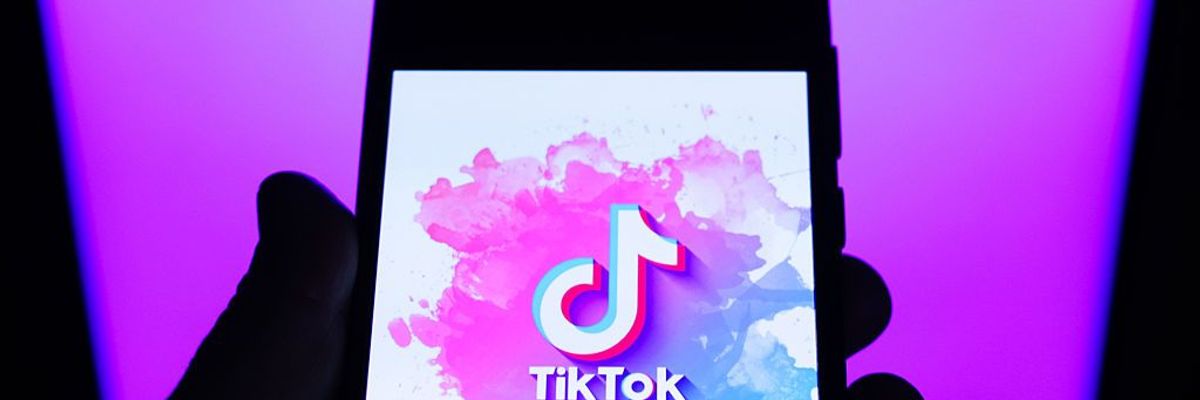
TikTok logo is displayed on a mobile phone screen for illustration photo. Gliwice, Poland on November21, 2025.
A Global Message to TikTok: Stop Your Profit Model of 'Toxic and Addictive' Content for Kids
"TikTok must make its platform safe for children and young people to socialize, learn and access information and not be harmed."
A group of digital activists is set to deliver a message to social media giant TikTok on Tuesday to clean up its "toxic and addictive" business model.
The petition, which has more than 170,000 signatures and is being circulated by human rights watchdog Amnesty International, will be delivered to TikTok's office in Dublin, Ireland by activists Mary Kate Harten and Trinity Kendi of Ireland; Abril Perazzini of Argentina; and Noe Hamon of France.
In the petition, Amnesty accuses TikTok of becoming "a space that is more and more toxic and addictive," and can potentially harm the "self-image, mental health, well-being of younger users."
Amnesty International campaigner Zahra Asif Razvi said that the petition is demanding that TikTok completely redo its business model to be built around user safety.
"These signatures represent a global demand for TikTok to replace its current business model of an app that is addictive by design with one that is safe by design," she said. "TikTok must make its platform safe for children and young people to socialize, learn and access information and not be harmed."
The human rights group says that its own research released last month shows that TikTok prioritizes user engagement over safety, and will often send young users to videos featuring "depression, self-harm and suicide content" on its platform.
Lisa Dittmer, Amnesty International's researcher on children and young people's digital rights, explained that teen users who express interest in content related to mental health can be pulled into "toxic rabbit holes" that glorify self-harm.
"Within just three to four hours of engaging with TikTok’s ‘For You’ feed, teenage test accounts were exposed to videos that romanticized suicide or showed young people expressing intentions to end their lives, including information on suicide methods," she explained. "The testimonies of young people and bereaved parents in France reveal how TikTok normalized and exacerbated self-harm and suicidal ideation up to the point of recommending content on 'suicide challenges.'"
Amnesty's petition comes one week after the American Psychological Association (APA) published research that accumulated data collected in more than 70 other studies and found that excessive use of short-form video apps such as TikTok and Instagram "is associated with poorer cognitive and mental health in both youths and adults."
The research's findings were particularly troublesome concerning the impacts on young people's cognitive development, as they found that "repeated exposure to highly stimulating, fast-paced content may contribute to habituation, in which users become desensitized to slower, more effortful cognitive tasks such as reading, problem solving, or deep learning."
The APA's study found that having the ability to swipe away from videos that don't offer instant gratification "could support a pattern of rapid disengagement from stimuli that do not provide immediate novelty or excitement," and thus "may diminish attentional control and reduce the capacity for sustained cognitive engagement, as cognitive processing becomes increasingly oriented toward brief, high-reward interactions rather than extended, goal-directed tasks."
An Urgent Message From Our Co-Founder
Dear Common Dreams reader, The U.S. is on a fast track to authoritarianism like nothing I've ever seen. Meanwhile, corporate news outlets are utterly capitulating to Trump, twisting their coverage to avoid drawing his ire while lining up to stuff cash in his pockets. That's why I believe that Common Dreams is doing the best and most consequential reporting that we've ever done. Our small but mighty team is a progressive reporting powerhouse, covering the news every day that the corporate media never will. Our mission has always been simple: To inform. To inspire. And to ignite change for the common good. Now here's the key piece that I want all our readers to understand: None of this would be possible without your financial support. That's not just some fundraising cliche. It's the absolute and literal truth. We don't accept corporate advertising and never will. We don't have a paywall because we don't think people should be blocked from critical news based on their ability to pay. Everything we do is funded by the donations of readers like you. Will you donate now to help power the nonprofit, independent reporting of Common Dreams? Thank you for being a vital member of our community. Together, we can keep independent journalism alive when it’s needed most. - Craig Brown, Co-founder |
A group of digital activists is set to deliver a message to social media giant TikTok on Tuesday to clean up its "toxic and addictive" business model.
The petition, which has more than 170,000 signatures and is being circulated by human rights watchdog Amnesty International, will be delivered to TikTok's office in Dublin, Ireland by activists Mary Kate Harten and Trinity Kendi of Ireland; Abril Perazzini of Argentina; and Noe Hamon of France.
In the petition, Amnesty accuses TikTok of becoming "a space that is more and more toxic and addictive," and can potentially harm the "self-image, mental health, well-being of younger users."
Amnesty International campaigner Zahra Asif Razvi said that the petition is demanding that TikTok completely redo its business model to be built around user safety.
"These signatures represent a global demand for TikTok to replace its current business model of an app that is addictive by design with one that is safe by design," she said. "TikTok must make its platform safe for children and young people to socialize, learn and access information and not be harmed."
The human rights group says that its own research released last month shows that TikTok prioritizes user engagement over safety, and will often send young users to videos featuring "depression, self-harm and suicide content" on its platform.
Lisa Dittmer, Amnesty International's researcher on children and young people's digital rights, explained that teen users who express interest in content related to mental health can be pulled into "toxic rabbit holes" that glorify self-harm.
"Within just three to four hours of engaging with TikTok’s ‘For You’ feed, teenage test accounts were exposed to videos that romanticized suicide or showed young people expressing intentions to end their lives, including information on suicide methods," she explained. "The testimonies of young people and bereaved parents in France reveal how TikTok normalized and exacerbated self-harm and suicidal ideation up to the point of recommending content on 'suicide challenges.'"
Amnesty's petition comes one week after the American Psychological Association (APA) published research that accumulated data collected in more than 70 other studies and found that excessive use of short-form video apps such as TikTok and Instagram "is associated with poorer cognitive and mental health in both youths and adults."
The research's findings were particularly troublesome concerning the impacts on young people's cognitive development, as they found that "repeated exposure to highly stimulating, fast-paced content may contribute to habituation, in which users become desensitized to slower, more effortful cognitive tasks such as reading, problem solving, or deep learning."
The APA's study found that having the ability to swipe away from videos that don't offer instant gratification "could support a pattern of rapid disengagement from stimuli that do not provide immediate novelty or excitement," and thus "may diminish attentional control and reduce the capacity for sustained cognitive engagement, as cognitive processing becomes increasingly oriented toward brief, high-reward interactions rather than extended, goal-directed tasks."
A group of digital activists is set to deliver a message to social media giant TikTok on Tuesday to clean up its "toxic and addictive" business model.
The petition, which has more than 170,000 signatures and is being circulated by human rights watchdog Amnesty International, will be delivered to TikTok's office in Dublin, Ireland by activists Mary Kate Harten and Trinity Kendi of Ireland; Abril Perazzini of Argentina; and Noe Hamon of France.
In the petition, Amnesty accuses TikTok of becoming "a space that is more and more toxic and addictive," and can potentially harm the "self-image, mental health, well-being of younger users."
Amnesty International campaigner Zahra Asif Razvi said that the petition is demanding that TikTok completely redo its business model to be built around user safety.
"These signatures represent a global demand for TikTok to replace its current business model of an app that is addictive by design with one that is safe by design," she said. "TikTok must make its platform safe for children and young people to socialize, learn and access information and not be harmed."
The human rights group says that its own research released last month shows that TikTok prioritizes user engagement over safety, and will often send young users to videos featuring "depression, self-harm and suicide content" on its platform.
Lisa Dittmer, Amnesty International's researcher on children and young people's digital rights, explained that teen users who express interest in content related to mental health can be pulled into "toxic rabbit holes" that glorify self-harm.
"Within just three to four hours of engaging with TikTok’s ‘For You’ feed, teenage test accounts were exposed to videos that romanticized suicide or showed young people expressing intentions to end their lives, including information on suicide methods," she explained. "The testimonies of young people and bereaved parents in France reveal how TikTok normalized and exacerbated self-harm and suicidal ideation up to the point of recommending content on 'suicide challenges.'"
Amnesty's petition comes one week after the American Psychological Association (APA) published research that accumulated data collected in more than 70 other studies and found that excessive use of short-form video apps such as TikTok and Instagram "is associated with poorer cognitive and mental health in both youths and adults."
The research's findings were particularly troublesome concerning the impacts on young people's cognitive development, as they found that "repeated exposure to highly stimulating, fast-paced content may contribute to habituation, in which users become desensitized to slower, more effortful cognitive tasks such as reading, problem solving, or deep learning."
The APA's study found that having the ability to swipe away from videos that don't offer instant gratification "could support a pattern of rapid disengagement from stimuli that do not provide immediate novelty or excitement," and thus "may diminish attentional control and reduce the capacity for sustained cognitive engagement, as cognitive processing becomes increasingly oriented toward brief, high-reward interactions rather than extended, goal-directed tasks."

